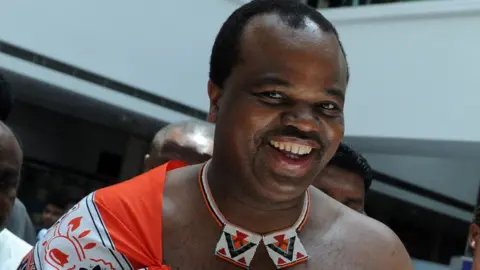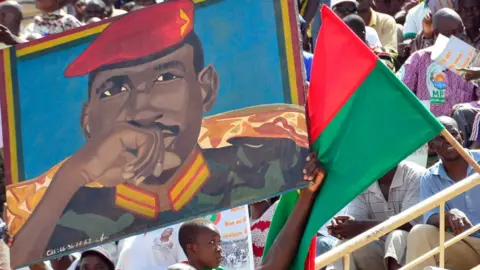Letter from Africa: Why did Swaziland take 50 years to change its name?
 AFP
AFPIn our series of letters from African journalists, Ghanaian writer Elizabeth Ohene explains why she backs the Swazi monarch's move to rename his country.
As the 50th birthday of King Mswati III approached on 19 April 2018, all indications pointed towards something dramatic taking place.
King Mswati being who he is, many speculated he might outdo himself and marry two or three new brides at once rather than adding just one to the 13 he already had, as is his normal practice.
The king had wanted his country to celebrate its 50th independence anniversary on his birthday even though independence was won on 6 September 1968.
Clearly King Mswati wanted to leave no doubts in anybody's mind that he himself was the state.
After all he and the state came into being in the same year, 1968, and they would celebrate their golden jubilee together.
As things turned out, the big announcement had nothing to do with the king acquiring a new wife. He simply announced he was changing the country's name.
The country we all used to call the Kingdom of Swaziland will now be known as the Kingdom of eSwatini.

Lesser-known facts about eSwatini/Swaziland:
 AFP
AFP- Africa's last remaining absolute monarchy
- A landlocked country, smaller than the US state of New Jersey
- King Mswati III currently has 13 wives; his predecessor had 125
- He can chose a new spouse at the annual reed dance (pictured above), a cultural event celebrating chastity and virginity
- Sugar is its main export earner
- Has the world's highest prevalence rate for HIV/Aids
- Low life expectancy with 54 years for men, 60 for women

Coming as I do from Ghana, I feel I must have sympathy for this move.
We changed our name at independence, going from the colonial-imposed "Gold Coast" to Ghana.
It might have taken them 50 years to do so, but if they have decided to correct what must be a colonial imposition of calling their country Swaziland, everybody should wish them well.
After all, eSwatini, we are told, simply means "land of the Swazis" - in other words, Swaziland.
It is not exactly like Ghana where we went back into history to claim a heritage that is still argued over.
Will South Africa become 'Azania'?
Other countries in the eSwatini neighbourhood did it without causing too much drama.
Very few people remember that Botswana got its name at independence and until then, was known as Bechuanaland.

Elizabeth Ohene:
 Elizabeth Ohene
Elizabeth Ohene"The trick is to change the country's name at independence and not wait until years later"

The same goes for Malawi, which until independence was known and called Nyasaland.
Zambia was Northern Rhodesia and who will ever forget that Zimbabwe was previously named Rhodesia?
The trick is to do it at independence and not wait until years later.
Every once in a while I wonder if one of these days we might wake up to the news that South Africa has decided to rename itself "Azania".
 AFP
AFPBack in the 1970s and 1980s and indeed up until the 1994 democratic elections, there were lots of people who assumed liberation from apartheid would bring a change of name to Azania.
If King Mswati III wanted to be really brave he could have followed the example of the late military leader of the country once called Upper Volta, Thomas Sankara, who jettisoned that colonial name in favour of the somewhat dramatic Burkina Faso, which means "the land of the upright men".
Or, King Mswati III could have renamed his country whatever the Swazi rendition is for "the land of many wives".
For the moment, we shall stick to the boring eSwatini.

More Letters from Africa

Follow us on Twitter @BBCAfrica, on Facebook at BBC Africa or on Instagram at bbcafrica


